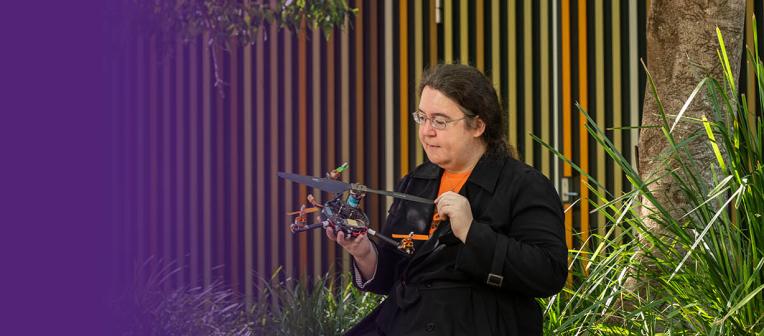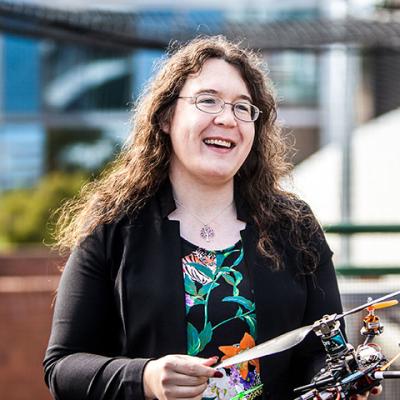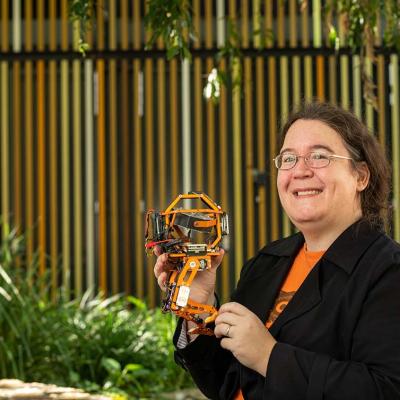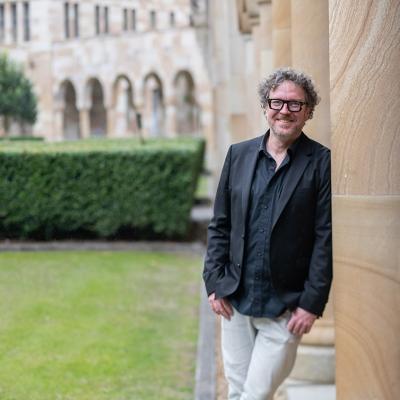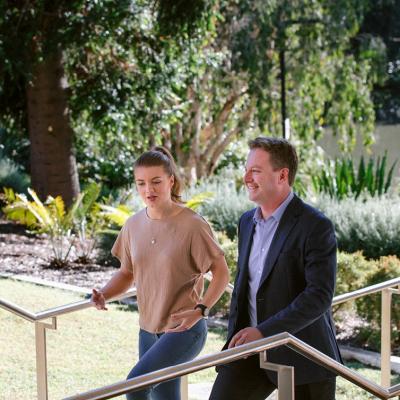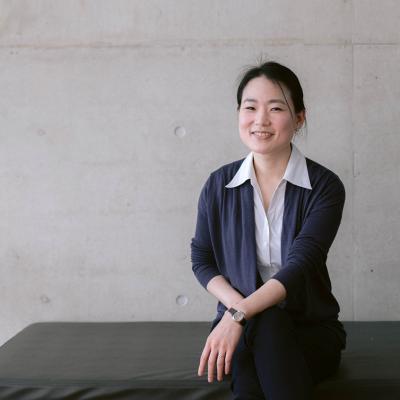Dr Pauline Pounds knew she wanted to be an engineer before she even understood what the word meant.
Mechatronics – technology which combines electronics with mechanical engineering – was Pauline’s calling from the moment she saw the fantastic robots of science fiction like Short Circuit’s Johnny Five and the droids and giant walkers of the Star Wars franchise.
She makes no secret that she has big ambitions.
"My heart belongs to the huge robotic war machines of Robotech, Battletech, and Robocop,” she says.
But the robots Pauline’s created in her career so far are more focused on improving human lives rather than destroying them. And instead of spreading war and mayhem, her mission is to teach and inspire her students to follow their passion and push the boundaries of mechatronics.
From science fiction to real life robotics
Pauline admits that robots both good and evil have inspired her various inventions.
“The hovering Hunter-killer VTOLs from Terminator 2 inspired me to work on hovering robots,” she says.
As a science fiction fan, Pauline’s inventions may be inspired by pop culture, but they’re created with knowledge gained from years of study and hard work. She spent much of her early days in academia researching aerial robotics and coming up with new and exciting ways to improve how they carry payloads and grasp and retrieve objects.
Lately, however, she’s been making strides in the field of walking robots.
Pauline’s students are well-acquainted with her Tiny Giant Robots (TGR), which embody her mission to make robots more accessible for everyone.
Walking robots are notoriously complicated and expensive to make, but Pauline’s stripped back TGR’s focus on the essentials needed to complete simple tasks. Think carrying groceries or patrolling premises. By simplifying the manufacturing process, Pauline is making robots more affordable for everyday people. Her mission is to eventually make her small prototypes – the Tiny Giant Robots – into life-sized human helpers. And, if Pauline has her way, much bigger ones too!
Find out more about Pauline’s Tiny Giant Robots and how they have the potential to save humanity from the evils of back problems and mundane household chores.
Pauline’s teaching approach
UQ students don’t just get to learn about Pauline’s various inventions; they’re helping her create them too.
Pauline teaches fourth-year course METR4810 Mechatronic System Design Project II. It’s a design-build project students usually undertake in their final year of studying the Bachelor of Engineering (Honours) program.
“My class requires students to work together to develop a mechatronics solution to a complex challenge,” she says.
“This could include anything from building microrobots to sort marbles, to autonomous boats to sail across a miniature ocean, or space telescopes to find life on exoplanets.”
She likes to step things up a notch by encouraging her students to think outside the box. For this reason, the engineering challenges and problems presented in the class usually have very few limitations.
“Problems like soft-landing a capsule thrown off a building or sorting a freight yard of small cargo containers,” she says.
“Unlike typical class work, there is no ‘right’ or ‘wrong’ answers – just solutions that work, and solutions that don’t.”
This motivates students to explore many possible approaches to problem-solving.
"Students work to their strengths and surprise themselves with how they were able to find a working result,” says Pauline.
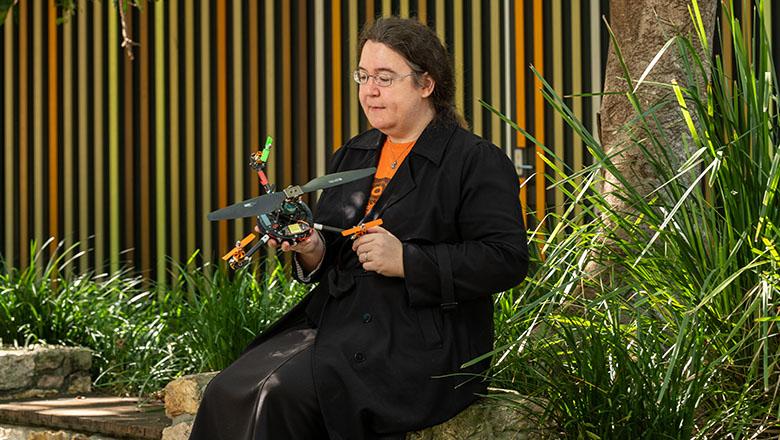
The 'Y-4' drone is a new type of triangular quadrotor with greatly enhanced flight time and payload capacity invented by Pauline.
While creating cool robots to solve real problems is definitely a drawcard of Pauline’s course, it also teaches essential professional skills.
“Students get a chance to put all their hard-won skills to use, as well as learning vital skills in project management and interpersonal collaboration.”
UQ students undertaking a Bachelor of Engineering (Honours) can choose to study the Mechatronic Engineering specialisation, where upon graduation, they could be snatched up by globally recognised companies such as BAE Systems, Arnott’s Australia, Epsom, Google, Amazon, Boeing ABB, Telstra, Uber and Accenture.
“Our mechatronics program offers a unique mix of deep technical learning in the underlying principles of robotics, control, dynamics and intelligent systems blended with practical, hands-on project learning, building working hardware,” says Pauline.
Proudest moments in teaching
When we ask Pauline what she loves most about teaching mechatronics, she's quick to launch straight into the nuances of her field.
“Mechatronics combines atoms with electrons: mechanical hardware with circuitry, computing and control,” she says.
“I get to introduce students to the beautiful dualities between mechanical and electrical dynamics, and then give them the skills to turn disobedient raw material into something that moves and functions and works as intended!”
Her proudest moments as a teacher, however, are when she gets to help students overcome challenges and thrive. She recalls a specific incident with a student who was struggling in class.
“She came into my office and we sat down to talk about life, engineering, teamwork and all the problems she was facing technically,” says Pauline.
Through hard work, perseverance, and support and encouragement from Pauline, this student was able to make it through, just by taking that first step and seeking help.
“When she finished, she actually did so well that she won a trophy in my lab.”
Pauline’s keen to debunk the myth that teachers are proudest of outstanding students with clear success stories.
“Any teacher can teach a brilliant student for whom everything is going perfect and whose having great success,” she says.
Transgender visibility in engineering
Pauline isn’t only an inspiration to her students because of her expertise in mechatronics and passion for the field. As a transgender woman, she’s also a huge advocate for the LGBTQIA+ community at UQ and for women in engineering.
“One insight you get as a transgender woman is seeing in sharp relief how people treat women differently from men in society,” says Pauline.
“We still have a long way to go in treating men and women equally for their intellectual merits, and I will continue to promote opportunities for women in engineering and science fields.”
“We’ve no shortage of brilliant women who deserve every opportunity to do amazing work.”
While Pauline feels blessed to work in a supportive community that welcomes her, she recognises that many transgender people do not have such positive experiences. This is part of the reason why she believes it’s so important for her to make herself known, particularly to students at UQ.
“As a trans person who has benefitted from the efforts of previous people in our community before me, I feel that if I don’t stand up and be heard and be available for people to see and think ‘hey look, she can do it and so I can do it’, then I’m not pulling my weight,” says Pauline.
“The fact that I see young people who can take that journey of self-discovery maybe a little easier than I had it, gives me a reason to stand up and be visible.”
"You can't be what you can't see."
Discover UQ’s Women in Engineering program or watch an interview with Pauline to learn more about transgender visibility at UQ.
Advice for future students
So, what kind of student would enjoy studying mechatronics?
“If you love complex mechanical things, if you’re intrigued by circuits and computers and gadgets, if you think building robots or drones or spacecraft or any sort of electromechanical machine sounds nifty, then go for it!” says Pauline.
When it comes down to it, it’s how interested you are in the subject matter. The skills can be taught – after all, that’s what university is for.
“If you can walk out of my lab with that fire in your heart to make something cool and use that thing to make the world awesome, then I’m happy.”
Discover the Bachelor of Engineering (Honours) Meet other UQ teachers

